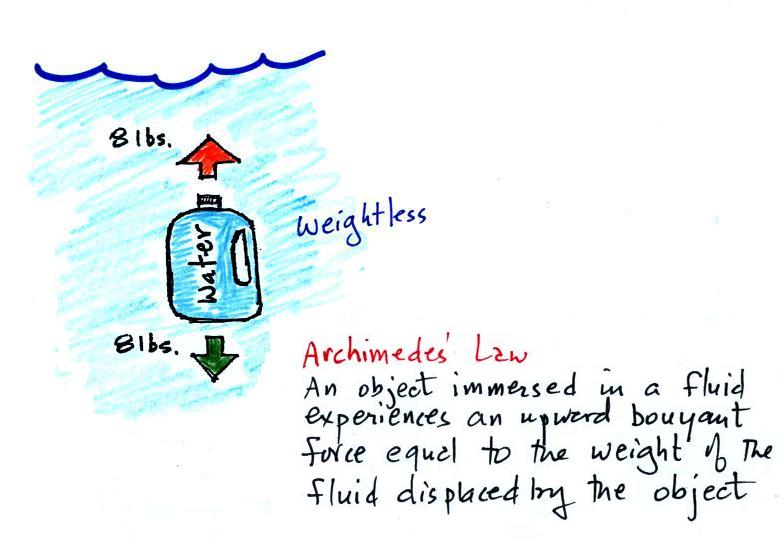Wednesday Feb. 5, 2014
Exotic music and dance from Beats Antique: "Egyptic"
and "Caterpillar".
If you missed the Practice Quiz you'll can download it here. I would
encourage you to have a look at it if only to become familiar with
the quiz format. Try answering the questions. Here are the answers so that
you can check and see how you would have done.
I'll try to get all the quizzes graded in time to return on
Friday. But I have to grade them all (both sections)
myself. My TAs are out of town.
Here's another way of trying to understand
why warm air rises and cold air sinks - Archimedes Law or
Principle. It's a perhaps simpler way of
understanding the topic. A bottle of water can help you to
visualize the law.
A gallon of water weighs about 8
pounds (lbs). I wouldn't want to carry that much water on
a hike unless I thought I would really need it.
If you submerge the gallon jug of water in a swimming pool,
the jug becomes, for all intents and purposes, weightless.
That seems kind of amazing - 8 pounds suddenly doesn't weigh
anything. Archimedes' Law (see figure below, from p. 53a
in the ClassNotes) explains why this is true.

Archimedes first of all tells you that the surrounding
fluid will exert an upward pointing buoyant force on the
submerged water bottle. That upward force is strong enough
to make the submerged jug become weightless.
Archimedes law also tells you how to figure out how strong the
buoyant force will be. In this case the 1
gallon bottle will displace 1 gallon of pool water. One
gallon of pool water weighs 8 pounds. The upward buoyant
force will be 8 pounds, the same as the downward force.
The two forces are equal and opposite.
What Archimedes law doesn't really tell you is what causes
the upward buoyant force. You should know what the force
is - it's the upward pressure difference force.
Now we imagine pouring out all the water and filling the 1
gallon jug with air. Air is about 1000 times less dense
than water; compared to water, the jug will weigh
practically nothing.

If you submerge the jug of air
in a pool it will still displace 1 gallon of water and the 8
pound upward buoyant force will still be there. Since
there is no downward force the jug will float (the bottle of
air would shoot up to the surface of the pool).
One gallon of sand (which is about 1.5 times denser than
water) weighs 12 pounds.
The jug of sand will sink because the
downward force is greater than the upward force.
You can sum all of this up by saying
anything that is less dense than water will float in water,
anything that is more dense than water will sink in water.
Most types of wood will float (ebony and ironwood will
sink). Most rocks sink (pumice is an exception).
The same reasoning applies to air in the atmosphere
though it's harder to appreciate because air is invisible.

Air that is less dense (warmer)
than the air around it will rise. Air that is more dense
(colder) than the air around it will sink.
Here's a little more
information about Archimedes that I didn't mention in class.
There's a colorful demonstration that shows how small
differences in density can determine whether an object floats or
sinks.

A can of regular Pepsi was
placed in a beaker of water. The can sank. A can
of Diet Pepsi on the other hand floated.
Both cans are made of aluminum which has a density almost
three times higher than water; aluminum by itself would
sink. The drink itself is largely water. The
regular soda also has a lot of high-fructose
corn syrup, the diet soda doesn't. The mixture of
water and corn syrup has a density greater than plain
water. There is also a little air (or perhaps carbon
dioxide gas) in each can (the diet soda probably wouldn't
float if it weren't for the gas in the can.
The average density of the can of regular soda (water &
corn syrup + aluminum + air) ends up being slightly greater
than the density of water. The average density of the
can of diet soda (water + aluminum + air) is slightly less
than the density of water.
In some respects people in swimming pools are like cans of
regular and diet soda. Some people float (they're a
little less dense than water), other people sink (slightly
more dense than water).









